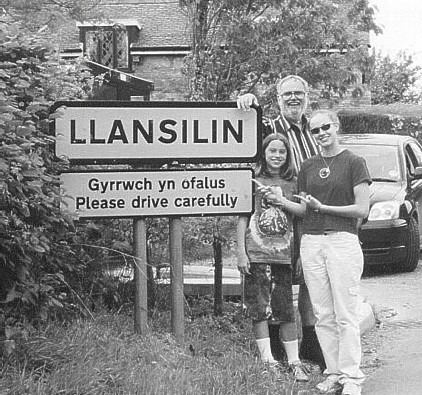
Art, Katie and Mariya stand by the sign for the village of Llansilin.
Double l�s are not easy to pronounce for a non-Welsh speaker.
Snapshots by Gloria Freeland - July 17, 2003
Language as part of the fun
At home in La Paz, Bolivia, my nieces speak Spanish with their Dad. At their American school and with their Mom, they speak English. They're completely bilingual, able to switch from one language to the other without missing a beat.
My second language is also Spanish, although I learned it later in life and don't have the fluency my nieces do. When we were on vacation last month, every time I heard someone say something in any language other than English, I would naturally switch to Spanish. That didn't work very well in Wales, Belgium, France, Switzerland, Liechtenstein, Germany or Poland.
I studied German, Russian, French and Spanish in college, but never really used any of them except Spanish. The old saying, "Use it or lose it," really applies with languages.
Before we left on our trip, I thought, "This will be great. I'll use my French in France and my German in Switzerland, Liechtenstein and Germany, and maybe I'll pick up a few words of Welsh and Flemish along the way."
We started out in London, where English is spoken - British English, not American English. If we had to go to the bathroom, we asked for the "loo," although toilet is also understood. If we wanted cookies, we asked for "biscuits." French fries are "chips." If we needed something out of the trunk of the car, we went around to the "boot." Nothing went wrong with our Toyota, but if it had, Art might have had to lift the hood - I mean "bonnet."
After London, we spent about a week in Wales, where English is also spoken, but where Welsh is an official second language. Art's Vaughan ancestors came from Wales. Vaughan, although now pronounced so it rhymes with lawn, was an attempt by the English to render the Welsh word "Fechan," which means "junior" or "small."
Many Welsh words are not easy to pronounce. Llansilin, the village where Art's great-grandfather Thomas Vaughan was born, is spoken something like "Thlansilin." Double l's in Welsh are pronounced by putting the tongue against the front teeth and blowing. It seemed I was spitting on everyone. A "w," if next to a vowel, is spoken just as we do, but otherwise it becomes an "oo" sound such as in our word loon. "Cwm" is pronounced coom and means a valley with only one opening. Trying to pronounce Welsh made me feel a bit loony.
In France, I could read and understand most menu items and some traffic signs - important when you're trying to figure out what to eat or where you're going! But by the time my French kicked in, we were already in the German-speaking part of Switzerland. I put away my French dictionary and took out the German one as we sat down at a restaurant in St. Gallen.
The waitress said, "Oh, I see you're studying German."
I replied, "Ouí," the French word for "yes."
Even the kids knew the answer should have been "ja," and we all laughed.
Art can get by pretty well in German so I depended on him a lot when we were in Switzerland and Germany. Our Swiss and German friends speak such good English, however, that we didn't practice our German much except when it was just the four of us.
One word that always seemed to have us chuckling was "fahrt," which means "to travel" or "to go." It's pronounced like the slang/vulgar English word spelled the same way without the "h" in the middle. After traveling the Autobahn at 140 kilometers - 84 miles - per hour for awhile, we became a bit punchy.
When an "Ausfahrt" (exit) sign appeared, Art occasionally said, "Better than an in-fahrt!"
When we passed a truck with the words "fahrt frisch und frosting" (travels fresh and frosty), I thought, "Better than stale and hot!"
Not knowing the language can at times be stressful, but it can also be a big part of the fun.
Art tells the story about the time he was in Amsterdam with his friend Bill and Bill's family. It was dark and rainy and they were lost. All eyes were searching for street names when suddenly Bill's son cried out, "I see one. 'Einbahnstrasse!'" Bill and Art immediately convulsed in laughter. Einbahnstrasse means "one-way street."

Art, Katie and Mariya stand by the sign for the village of Llansilin.
Double l�s are not easy to pronounce for a non-Welsh speaker.